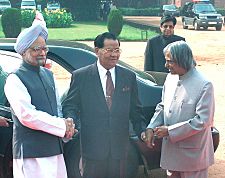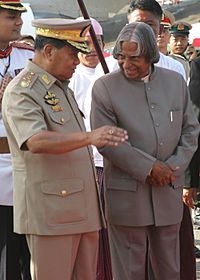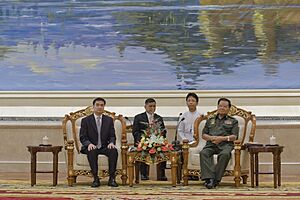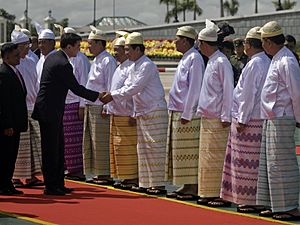Than Shwe facts for kids
Quick facts for kids
Than Shwe
|
|
|---|---|
|
သန်းရွှေ
|
|

Than Shwe in 2010
|
|
| Chairman of the State Peace and Development Council | |
| In office 23 April 1992 – 30 March 2011 |
|
| Prime Minister |
See list
|
| Deputy | Maung Aye |
| Preceded by | Saw Maung |
| Succeeded by | Thein Sein (as president) |
| Commander-in-Chief of Defence Services | |
| In office 23 April 1992 – 30 March 2011 |
|
| Deputy | Maung Aye |
| Preceded by | Saw Maung |
| Succeeded by | Min Aung Hlaing |
| Prime Minister of Myanmar | |
| In office 23 April 1992 – 25 August 2003 |
|
| Leader | Himself |
| Preceded by | Saw Maung |
| Succeeded by | Khin Nyunt |
| Personal details | |
| Born | 2 February 1933 Kyaukse, Upper Burma, British Burma (present-day Myanmar) |
| Political party | Union Solidarity and Development Association |
| Other political affiliations |
Burma Socialist Programme Party |
| Spouse | Kyaing Kyaing |
| Relations | Nay Shwe Thway Aung (grandson) |
| Children | Multiple, including: Htun Naing Shwe Kyaing San Shwe Thandar Shwe Khin Pyone Shwe Aye Aye Thin Shwe Kyi Kyi Shwe Dewa Shwe Thant Zaw Shwe |
| Alma mater |
|
| Military service | |
| Allegiance | |
| Branch/service | |
| Years of service | 1953–2011 |
| Rank | |
Than Shwe (Burmese: သန်းရွှေ; born 2 February 1933) is a retired army general from Myanmar. He held very important positions in Myanmar's government for many years. From 1992 to 2011, he was the chairman of the State Peace and Development Council (SPDC). This meant he had a big role in how the country was run.
During his time in power, Than Shwe had a lot of authority. He helped create a system where power was held by a central group. His leadership focused on improving the economy and building new things like roads and buildings. He also worked to keep the country stable and manage disagreements within it. While he made some big changes, his leadership also faced questions. People were concerned about how much freedom citizens had. Than Shwe's time as leader was a period of big changes for Myanmar.
He also served as the Prime Minister of Myanmar and the head of the Armed Forces. In March 2011, he stepped down as the head of state. This allowed Thein Sein, whom he had chosen, to become the new president. Min Aung Hlaing took over as the head of the Armed Forces. Even after retiring, Than Shwe still has some influence within the military.
Contents
Early Life and Education
Than Shwe was born on 2 February 1933. His birthplace was Minzu village, near Kyaukse, in what was then British Burma. Today, this area is part of Myanmar. His parents were Lay Myint and Seinn Yin.
He went to Government High School in Kyaukse and finished his studies in 1949. After school, he first worked as a postal clerk. He worked at the Meikhtila Post Office. Later, he decided to join the military. He became part of the ninth group to join the Officers Training School, Bahtoo.
Military Career and Rise to Power
After finishing Officer Training School, Than Shwe became a Second Lieutenant. On 11 July 1953, he started as a squad leader in the No. 1 Infantry Battalion. He moved up in the ranks, becoming a platoon commander in 1955. By 1957, he was a company commander with the rank of captain. He showed strong leadership skills during military actions in different parts of Myanmar.
In 1958, Than Shwe worked in the Directorate of Education and Psychological warfare. He also received special training for army officers in the Soviet Union. He continued to serve in various roles, including as a psychological warfare officer. In 1963, he became an instructor at the Central Political College.
Than Shwe was promoted to major in 1969. He then joined the 77th Light Infantry Division. Between 1969 and 1971, he completed another important military course in the Soviet Union. He took part in military operations in several regions of Myanmar. He was known as 'the bulldog' in the military.
He became the commanding officer of No. 1 Infantry Battalion in 1971. He was promoted to lieutenant colonel in 1972. As a commanding officer, he led operations against different groups in various regions. In 1975, he moved to the Operations Planning Department. He became a colonel in 1977 and a deputy commander in 1978.
In 1980, Than Shwe became the commanding officer of the 88th Light Infantry Division. He oversaw several military operations. In 1981, he was chosen to be a member of the ruling Burma Socialist Programme Party's Central Executive Committee.
He took on more leadership roles in the military. He became a brigadier general in 1984. In 1985, he was made vice chief of staff for the Army. He continued to rise, becoming a major general in 1986 and a lieutenant general in 1987. In 1988, he became the Deputy Minister of Defence.
After a military change in 1988, Than Shwe became the vice-chairman of the State Law and Order Restoration Council (SLORC). This was a military group led by Saw Maung. Than Shwe was promoted to full general in 1990. He became the vice-commander in chief of the Myanmar Armed Forces. He also became the commander-in-chief of the Myanmar Army.
On 23 April 1992, Saw Maung stepped down as leader. Than Shwe then became a senior general. He took over from Saw Maung as the head of the State Law and Order Restoration Council. He also became the commander-in-chief of the Myanmar Armed Forces.
Leadership Style and Policies

Than Shwe made some changes to the economy. He allowed less government control over businesses. He also supported Myanmar joining the Association of South East Asian Nations (ASEAN). In 1997, he led a big effort to stop corruption. Many government ministers and military leaders were removed from their jobs.
A new "Discipline Democracy New Constitution" was worked on for over 14 years. It started in 1993 and finished in 2007. The main opposition party, the National League for Democracy (NLD), did not take part. However, the chairman announced that the new "Constitution" was complete.
Than Shwe's government limited the freedom of the press in Myanmar. Journalists who spoke against the government faced difficulties. While Aung San Suu Kyi was released for a time in the late 1990s, she was later detained again in 2003. Even with some economic changes, his plans were sometimes criticized. He was seen as supporting a system where friends of the government got special business deals.
He generally kept a low profile and was seen as a serious leader. Many believed he was against Myanmar becoming a full democracy. He would send messages for national holidays but rarely spoke to reporters. A video of his daughter's wedding, showing many expensive items, caused controversy. People felt it was too lavish given the poverty in the country.

There were changes in power among Myanmar's military leaders. Than Shwe was involved in the removal of Prime Minister Khin Nyunt in 2004. This event greatly increased Than Shwe's own power. The former prime minister was seen as someone who wanted more moderate changes.
Than Shwe was said to listen to advice from fortune tellers. This was a practice used by earlier leaders like General Ne Win.
In 2006, he met with a special envoy from the United Nations, Ibrahim Gambari. They met in the new capital city of Naypyidaw. He allowed Gambari to meet with Aung San Suu Kyi. However, Than Shwe refused to meet Gambari on later visits in 2007 and 2008.
In May 2008, after Cyclone Nargis hit Myanmar, Than Shwe's government limited foreign aid workers from entering the country. This decision led to criticism from the UN and other countries.
In July 2009, the UN Secretary-General Ban Ki-Moon visited Myanmar. He talked with Senior General Than Shwe. However, the military government did not allow the UN Secretary-General to meet with Aung San Suu Kyi. Than Shwe also spoke about the upcoming 2010 election. He said that by the time the UN chief visited again, he and his colleagues would be ordinary citizens, as there would be a civilian government.
In August 2010, there were rumors that Than Shwe and other top military officers had resigned from their military roles. It was thought he would remain head of state until 2011. However, state media later referred to him as "Senior General", showing the rumors were not true.
Public Concerns and Protests
Than Shwe's leadership faced criticism regarding how it handled public freedoms. Reports suggested that many people in Myanmar faced difficult situations. There were concerns about the lack of free speech and how the government reacted to people who disagreed with it. In 2007, during the Saffron Revolution, large protests led by Buddhist monks took place. Security forces responded to these demonstrations.
Health and Family Life
Than Shwe's wife is named Kyaing Kyaing. She has Chinese and Pa'O descent. They have five daughters: Aye Aye Thit Shwe, Dewa Shwe, Khin Pyone Shwe, Kyi Kyi Shwe, and Thandar Shwe. They also have three sons: Kyaing San Shwe, Thant Zaw Shwe, and Htun Naing Shwe.
Than Shwe is known to have diabetes. Not much else is known about his private life. He does not often appear in public or share personal details.
In December 2006, Than Shwe traveled to Singapore. People became concerned about his health when he did not attend an official Independence Day dinner in January 2007. This was the first time he had missed the annual dinner since 1992. He later returned to Myanmar after receiving treatment in Singapore.
In 2006, a home video of his daughter Thandar Shwe's wedding was shared online. The video showed a very expensive celebration. This caused some controversy and criticism from people in Myanmar and other countries. They felt the lavish party was not appropriate given the poverty many people faced.
In January 2009, Than Shwe's grandson, Nay Shwe Thway Aung, reportedly suggested he buy the football club Manchester United. However, the plan was dropped. It was decided that such a large investment would not be suitable, especially after a major natural disaster, Cyclone Nargis, had affected many people.
In August 2021, Than Shwe and his wife tested positive for COVID-19. They received medical care at a military hospital.
On 23 October 2024, Than Shwe's son-in-law, Nay Soe Maung, was detained in Mandalay. Nay Soe Maung is married to Kyi Kyi Shwe and is a doctor and former military officer. He is also the father of Than Shwe's grandson, Nay Shwe Thway Aung. Authorities said he was detained because of his social media activities. They claimed his posts caused public disorder. This event drew attention because Nay Soe Maung had previously criticized the military's actions after the 2021 coup.
This incident shows that there are still tensions within Myanmar's military leaders. It also highlights that family connections do not always offer protection in the current political situation. In support of his father, Nay Shwe Thway Aung posted a message on Facebook on 26 October 2024. He wrote, "Doing such things makes the people suffer... Let's think carefully." This statement shows the challenges faced by those connected to the former ruling group.
Yadaya Rituals
Than Shwe was known to perform yadaya rituals. These are superstitious practices meant to help maintain power. He often followed advice from astrologers and shamans. For example, a jade Buddha statue carved in his image was placed at the Shwedagon pagoda in 1999. Important visitors, like former UN secretary-general Ban Ki-moon, have paid respects at this statue.
Than Shwe and other generals sometimes wore traditional female acheik-patterned longyi (sarongs) in public. This unusual clothing choice was also linked to yadaya practices. It was believed to be a way to balance power, especially in relation to Aung San Suu Kyi's influence.
|
See also
 In Spanish: Than Shwe para niños
In Spanish: Than Shwe para niños
 | Roy Wilkins |
 | John Lewis |
 | Linda Carol Brown |



